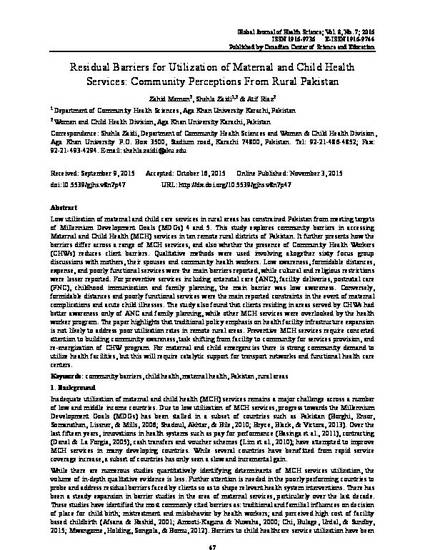
Low utilization of maternal and child care services in rural areas has constrained Pakistan from meeting targets of Millennium Development Goals (MDGs) 4 and 5. This study explores community barriers in accessing Maternal and Child Health (MCH) services in ten remote rural districts of Pakistan. It further presents how the barriers differ across a range of MCH services, and also whether the presence of Community Health Workers (CHWs) reduces client barriers. Qualitative methods were used involving altogether sixty focus group discussions with mothers, their spouses and community health workers. Low awareness, formidable distances, expense, and poorly functional services were the main barriers reported, while cultural and religious restrictions were lesser reported. For preventive services including antenatal care (ANC), facility deliveries, postnatal care (PNC), childhood immunization and family planning, the main barrier was low awareness. Conversely, formidable distances and poorly functional services were the main reported constraints in the event of maternal complications and acute child illnesses. The study also found that clients residing in areas served by CHWs had better awareness only of ANC and family planning, while other MCH services were overlooked by the health worker program. The paper highlights that traditional policy emphasis on health facility infrastructure expansion is not likely to address poor utilization rates in remote rural areas. Preventive MCH services require concerted attention to building community awareness, task shifting from facility to community for services provision, and re-energization of CHW program. For maternal and child emergencies there is strong community demand to utilize health facilities, but this will require catalytic support for transport networks and functional health care centers.
Available at: http://works.bepress.com/zahid_memon/15/
